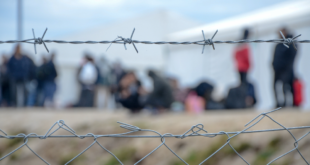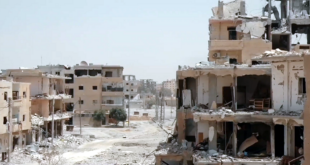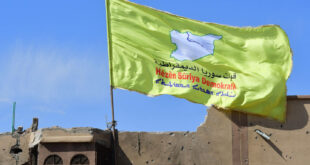Russia and Turkey are backing opposing warring parties in three active conflicts. However, this adversarial positioning has not hindered cooperation between Moscow and Ankara. They reign in opposing sides and, in effect, stage-manage their respective theatres of wars. Through multilateral arrangements, Europe is an enabler of Turkey’s position and could leverage its support to push Ankara to cooperate more effectively with its Western partners.
Since 2015 in Syria and later in Libya and Nagorno-Karabakh, Moscow and Ankara have actively supported opposing warring parties. In each case, as explained below, Russia’s and Turkey’s military actions have strengthened one another and led to domination on their respective sides. We see an emergent pattern that is being established in Syria and turned into a calculated cooperation model that is being implemented in Libya and the South Caucasus.
How the Pattern Emerged in Syria
Until 2016, among the two backers of Syria’s Bashar al-Assad regime, Iran had the upper hand over Russia and exerted more influence on the regime apparatus and the ruling Assad family. Iran was the first country to come to Damascus’ help by providing weapons, financial support, advisors, and proxies to fight the armed rebellion. When Turkey doubled down on its involvement in Syria starting in late 2015, the Assad regime could not turn to Tehran for protection, since Iran lacked the capacity to deliver. As the Turkish threat was combined with the possibility of imminent and crippling Western airstrikes, the Assad regime had little choice but to become more reliant upon Russia. In that way, Turkey’s presence allowed Moscow to dominate the Syrian regime and reduce Iran’s influence.
Turkey became the dominant backer of the opposition, as the armed groups realised they could not survive without Turkey due to Russia’s intervention. Regional rivals such as Saudi Arabia gradually lost influence on the ground. Western diplomatic and political influence over the Syrian opposition also eroded – to Ankara’s benefit.
In December 2016, Vladimir Putin and Recep Tayyip Erdogan envisaged Astana, Kazakhstan’s capital, as a new venue for carrying on the Syria peace talks. In doing so, they also set in motion a game plan through which Moscow and Ankara controlled the warring parties in Syria and took control of the conflict. The Astana Process removed international mediation mechanisms set up in Vienna and Geneva from the centre of attention. The Turkish-Russian cooperation also further curbed Iran’s influence, since tensions between the Turkey-backed rebels and proxies and the Assad regime had been resolved through bilateral Ankara-Moscow talks rather than in Astana.
Ankara’s successful pressure campaign on Washington in 2019 to reduce the amount of help it was giving to the Syrian Kurds was of benefit to Moscow, which saw the presence of the United States and the partnership in eastern Syria to be much more challenging than Turkey’s presence in north-west Syria. In 2016, Russia had given the green light for the Turkish incursion into Syria. In return, Ankara, in effect, facilitated the regime takeover of Aleppo, the most important city under rebel control.
Exporting the Model to Libya and South Caucasus
In Libya, towards the end of 2019, Turkey began to increase its level of engagement with the UN-backed Tripoli government by sending military trainers, planners, Syrian mercenaries, and armed drones. On the opposite side, forces allied with Field Marshal Khalifa Haftar received varying degrees of support from the United Arab Emirates, Egypt, France, and Russia. Haftar was able to leverage these backers against one another. But the intensity of the Turkish intervention increased Haftar’s reliance on Russia for military backing, because it soon became apparent that only Moscow could provide the eastern Libyan forces with the necessary advanced weaponry and the personnel to operate them to stop the Turkish-backed government forces in Tripoli. Russia swiftly provided Pantsir-type air defence systems, operatives of Wagner – a pro-Kremlin private security firm – Syrian mercenaries, and eventually, in the autumn of 2020, game-changer MiG-29 and Su-24 fighter jets to Haftar’s Libyan National Army forces. The deployment of these Russian fighter jets stopped the counter-offensive by the Tripoli-based government. The conflict has since frozen, and there have been no significant territorial changes. Once again, Turkey and Russia helped one another become the top influential external powers in a foreign country. The involvement of the United States has varied – from aid programmes to diplomatic pressure on warring parties to return to the UN-led peace process. Washington’s aim to reduce the amount of foreign interference has so far not succeeded.
In the Azerbaijan-Armenia conflict, the United States and France, along with Russia, failed to utilise the Minsk Group platform of the Organization for Security and Co-operation in Europe to broker a negotiated solution to the Nagorno-Karabakh conflict. The United States and France had lost most of their influence over the dispute by the end of the 45-day war between Azerbaijan and Armenian forces in early November 2020. Nikol Pashinyan, the Armenian prime minister, has been pushing for a pro-Western agenda since 2018 to balance relations with Russia. On the other hand, the Azerbaijani government enjoys good relations with multiple actors – including Russia, Turkey, and Israel – but not with Iran. When Turkey stepped up its support for the Azeri offensive against the Armenians, it left the Yerevan government without much choice but to turn to Russia for help. Turkey also benefited by increasing and formalising its influence over Azerbaijan and in the region. Russia consolidated its position as the dominant external power over Armenia, with the Nagorno-Karabakh war leaving Pashinyan domestically weakened.
This pattern was successfully implemented in three theatres of war, and not necessarily through official agreements laying out the rules of the game plan. It works because the actors came to understand that this approach is beneficial for both. The lack of a determined third actor from the West in any of the theatres of war also facilitated the Turkish-Russian experiment in their adversarial collaboration.
Why Russia Prefers Turkey As the Rival of Choice
Russia prefers Turkey to other rivals because Moscow has more – and at times decisive – leverage on Ankara. The asymmetric balance of power between the two was established in the aftermath of Turkey shooting down a Russian fighter jet in November 2015 in the context of the Syrian conflict. Within months, Moscow utilised various factors to pressure Turkey. Visible measures ranged from restricting trade and travel between the two countries and a threat to stop investment into its nuclear energy infrastructure to official media campaigns targeting the Turkish president and his family. Less visible and indirect steps included Russia lending active political support to Kurds in Syria and Turkey and potential military support to fighters in the Kurdistan Workers’ Party (PKK) battling the Turkish military. The episode demonstrated that the Kremlin has more options to hit Turkey economically and politically than vice-versa.
Russia is, thus, the senior partner in this relationship. In Syria, Libya, and South Caucasus, there are various significant gains that Turkey can achieve by cooperating with Russia. Russian help in Syria could prevent a de jure Kurdish autonomy in the country. In Libya, sidelining other backers of Haftar and the Tripoli government could help secure Turkish economic and political interests, including getting Libya to back Turkey’s claims for exclusive economic zones in the Eastern Mediterranean. Through Turkish-Azeri cooperation in Nagorno-Karabakh, Ankara aims to increase its military footprint and enlist the Azeri leadership to partner against third parties across the region. As relations between Russia and Turkey become even more complicated – with coordinated efforts and rivalries in three countries and other bilateral relationships between Turkey and Russia – the risks concerning each theatre of war decrease further. The duo could still contain problems in an individual theatre of war through quid pro quos in various areas of their relationship.
“Reflexive Control”
Borrowed from science, the term “adversarial collaboration” denotes experiments conducted by people who disagree on an issue to resolve or reduce their differences. In the present context, it is employed to describe Russia and Turkey opting to experiment with a collaborative relationship at the expense of other actors. This is achieved after establishing an asymmetric balance of power that ensures Turkey will lose more and Russia will win less if they continue with a zero-sum game strategy. The strategy emerged as a result of the improvisation and political calculations of the Kremlin and the Presidential Palace in Ankara.
However, the theoretical core of the adversarial collaboration has its roots in the concept known as “reflexive control”, a Soviet-era technique used to manipulate an opponent into making decisions that lead to their defeat. This technique has been updated and implemented by Vladislav Surkov, who was Putin’s adviser until February 2020. Surkov, who is dubbed the “puppet master” of the Kremlin, managed several projects inside Russia to control the domestic political landscape. These involved simultaneously supporting civic forums and human rights NGO’s as well as the nationalist movements that accuse those same forums of being Western agents. The method transcends the tactic of supporting one conflicting side against the other and involves engaging with both parties to the advantage of one against the other.
In conflicts beyond Russian territory, reflexive control is not straightforward. Moscow would not have the same level of control over the entire geopolitical landscape as it would within Russia. With Turkey’s help, though, Russia can replicate abroad a pattern that is well-versed at home. Russia controls one side; Turkey dominates the opposing party. Through its multiple layers of leverage against Turkey, Moscow came to influence both warring parties in Syria, Libya, and South Caucasus – directly through its own engagement, and indirectly through Ankara’s engagement.
The Turkish establishment is also not alien to methods for managing the domestic opposition. These include setting up fake opposition parties and groups to sideline real threats, as was exemplified in the early days of the Turkish republic when President Mustafa Kemal Ataturk set up a government-sanctioned communist party while eliminating the leaders of the authentic Communist Party of Turkey.
Where Is the EU in All This?
The EU is one of the enablers of Turkey’s policy towards Russia. Positioning itself within Western multilateral arrangements gives Ankara an edge over Moscow.
Syria is a good example. Western support helps Ankara pressure Moscow to limit the Russian-backed advances of the Syrian regime in Idlib. The Transatlantic Alliance’s support is currently not conditional on Turkey coordinating with the West on broader Syrian policy. In other words, Ankara plays Western support as a card when negotiating with Russia, but it does not coordinate its actions with its partners. Leading European countries such as Germany and France have so far limited themselves to providing passive diplomatic, political, and economic support for Turkish actions in Syria. Realising that it is an enabler of the Turkish balancing act against Russia, the EU could make its support conditional in order to push Turkey towards more effective cooperation.
Understanding Turkish-Russian relations within the framework of power imbalances and the analysed mechanism, the EU could make a more realistic assessment of the nature of the adversarial collaboration between Moscow and Ankara. The adversarial positioning in each of these theatres of war will not lead to active confrontation between Ankara and Moscow. This assessment, which runs contrary to some analysts’ expectations, will remain the case as long as Russia holds the cards, such as potential intervention into the Kurdish conflict by threatening to provide rebels with access to sophisticated Russian weaponry.
Although a military confrontation between Russia and Turkey is unlikely, the equilibrium between Turkey and Russia may still change and lead to one of the two gradually losing out. The killing of dozens of Turkish soldiers in Idlib as a result of Russian-backed aerial bombardment was one episode showing how Turkey could lose out if and when coordination with Moscow fails.
The Russian-Turkish partnership paradigm, which is, in essence, a military control model, has proven to be useful in controlling conflicts and turning them into frozen ones. Keeping conflicts frozen could be more costly and risky than bringing about reconciliation to those conflicts in a way that would allow Moscow and Ankara to maintain influence. This potential weakness is on display in the arduously slow pace of political resolution efforts in Syria under the Astana Process. But in Libya, Moscow and Turkey may see the first big failure of their model: The UN-led process for reconciliation between the Tripoli and Benghazi governments received support from a significant portion of military leaders on the ground as well as backing from the United States, France, and increasingly Italy. The Libya example demonstrates that the Russian-Turkish model is weaker against attempts made by third parties to achieve peaceful reconciliations.
Therefore, if Ankara wants to have a long-term, lasting influence in the conflict-ridden regions, aligning itself with European partners is a better option to win the peace – and not just to control the conflict.
 Eurasia Press & News
Eurasia Press & News



